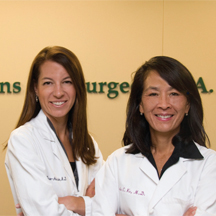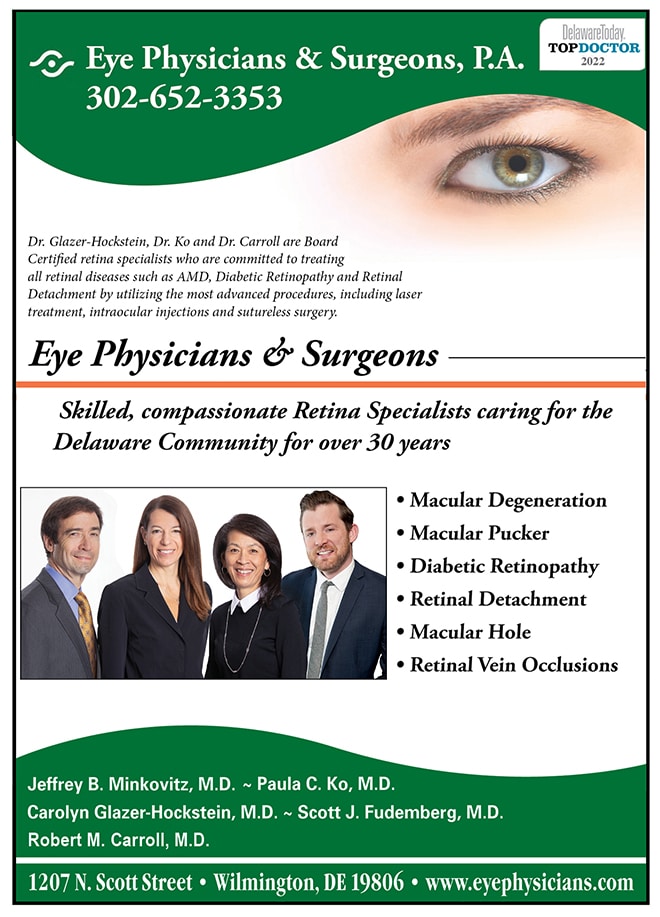AI Technology & Ophthalmology In 2024
By Dr. Paula C. Ko, M.D.
In the United States, people over the age of 65 are expected to grow to 23% of the population by 2050, which is a 47% increase from our current demographic. In Delaware, just like the U.S., people are living longer. In addition, many retirees are choosing Delaware as a place to relocate due to the beach and low taxes! Hence, our health system will be filled with an increasing population of elderly patients to care for. Perhaps you already notice the difficulty in finding a primary care doctor. With the increase in the aging population, the need for doctors is going up.
In Ophthalmology, we care for many elderly patients as diabetes, macular degeneration, cataracts and glaucoma become more prevalent as we age. As the demand goes up, we are continuing to find ways to provide access to great eye care for all Delawareans. Medicine is finding ways to help harness AI’s power, all while keeping the ever-important doctor-patient relationship intact. AI technology in medicine is still young but growing more powerful every day.
In Ophthalmology, we are seeing AI technology take off in diagnosing diabetic retinopathy and referring patients to specialists who can treat diabetic retinopathy. In addition, AI technology is being developed to diagnose Glaucoma and Age-related macular degeneration. All three are leading causes of blindness in the United States. Last, the eye has been known to hold some clues in diagnosing Alzheimer’s Disease. Studies are being done, via photographs of the retina, to non-invasively diagnose early Alzheimer’s Disease using AI technology.
Diabetic Retinopathy
Diabetic Retinopathy is the leading cause of blindness in the U.S. in patients between 30-50 years of age. Americans are living longer, more sedentary, and more overweight, all which increase the likelihood of developing diabetes. AI technology can analyze images taken of the retina, and recognize things like microaneurysms, intraretinal hemorrhages, exudates, and macular edema, which are hallmarks of diabetic retinopathy. These images are taken of a diabetic’s retina in a primary care doctor’s office or sometimes even at home, and within seconds, is read with AI technology. The patient is referred promptly to an ophthalmologist or a retina specialist if immediate treatment is needed. We are already using a camera in Delaware with this technology. The camera is non-mydriatic, which means a patient does not need to be dilated.
Age-Related Macular Degeneration
Age-Related Macular Degeneration (AMD) is the leading cause of blindness in patients over the age of 60, and because Americans are living longer, there are more patients with AMD. AI technology is being developed to screen patients for AMD, as patients may not know they have the disease if still in the early stages. There are many successful treatments such as injections in the eye for wet AMD and a new injection for dry AMD with geographic atrophy. Earlier diagnosis allows us to initiate treatment sooner. Stay tuned for more development of this screening technology!
Glaucoma
Glaucoma is characterized by Optic Nerve damage causing peripheral vision loss and total blindness if not treated. AI technology is being developed to diagnose glaucoma and get people to treatment if found to have the disease. In 2011, 2.71 million Americans had glaucoma. In 2050, it is estimated that 7.32 million Americans will have glaucoma. Many people do not know they have glaucoma until they start losing a significant amount of peripheral vision. Diagnostic photographs with AI technology can get more people screened earlier and referred to an ophthalmologist before vision loss occurs. This technology is also in its infancy but expanding rapidly.
Alzheimer’s Disease
Some studies have noticed a potential link between Alzheimer’s Disease and Retinal Nerve Fiber Layer thinning as well as Amyloid-Beta deposits in the Retina. Technology is being developed to see if screening with an AI-based fundus camera can offer a non-invasive diagnostic approach to diagnosing Alzheimer’s Disease.
In summary, AI-based technology has started screening for diabetic retinopathy as there are diagnostic products on the market that are FDA approved. It is mostly done in the primary care doctors’ offices and abnormal findings prompt referrals to specialists. As AI technology advances, we hope to create large efficient screenings for other eye diseases such as AMD and Glaucoma. Nothing will replace the very important Doctor-Patient relationship, but large screenings will allow us to care for the enlarging elderly population in the U.S. Stay tuned! For more information visit our website at www.eyephysicians.com.
follow us on facebook & instagram
Bios
A board certified physician, Dr. Paula Ko focuses on retinal problems, particularly diabetic eye disease, macular degeneration, retinal detachment, and macular pucker and macular holes. Dr. Ko received her undergraduate degree from the Ohio State University College of Engineering, graduating with honors. She returned to Ohio State for her medical degree, graduation with honors from the College of Medicine.
Following her medical/surgical internship at Riverside Methodist Hospital in Ohio, she completed her residency in ophthalmology at Temple University Hospital in Philadelphia, where she served at Chief Resident. She served a prestigious fellowship at Georgetown University Hospital in Washington, DC in diseases of the retina and vitreous. Dr. Ko has been a partner at Eye Physicians and Surgeons, P.A. for over 25 years. She is also on the staff of the Temple University Hospital. Considered a leader in her field, she has lectured extensively on retinal diseases and other topics in ophthalmology.
Dr. Carolyn Glazer-Hockstein focuses on patients with retinal diseases, including age-related macular degeneration, diabetic retinopathy, and retinal vascular disease. Dr. Glazer-Hockstein received her medical degree from Jefferson Medical College in Philadelphia, where she graduated with honors, was elected to the Hobart Armory Hare Medical Society and Alpha Omega Alpha Medical Honor Society, and earned the Carroll R. Mullen Memorial Prize in Ophthalmology. After completing her internship at Presbyterian Medical Center, she stayed in Philadelphia to complete her residency at the Scheie Eye Institute of the University of Pennsylvania, where she was elected chief resident. She completed a medical retina fellowship at the Scheie Eye Institute.
Dr. Glazer-Hockstein practices the most up-to-date diagnostic and treatment techniques of retinal diseases including laser therapies and injections. Her research has been published in journals such as the American Journal of Ophthalmology, Journal of Musculoskeletal Medicine, and Retina. She has also presented at national and international conferences including the Asia Pacific Society of Ophthalmic Plastic and Reconstructive Surgery in Sydney, Australia, the North American Neuro-Ophthalmology Society, and the American Academy of Ophthalmology National Meeting and the Association for Research in Vision and Ophthalmology. Dr. Glazer-Hockstein was recognized as a Top Doc in ophthalmology in Delaware Today magazine for 2012, 2016- 2018 and 2022.
Robert M. Carroll, MD is a board-certified, fellowship-trained retina specialist. He focuses on the evaluation and treatment of patients with medical retinal disease such as diabetic retinopathy, age-related macular degeneration, retinal vascular occlusion, and posterior uveitis. He also performs retinal surgery to treat retinal detachment, macular holes and puckers, complications from diabetes, and secondary intraocular lenses. Originally from New Jersey, Dr. Carroll completed his undergraduate degree in biochemistry with honors at the University of Notre Dame and earned his medical degree at Rutgers-Robert Wood Johnson Medical School. He completed his internship at Albert Einstein Medical Center in Philadelphia, residency in ophthalmology at Mount Sinai Hospital in New York City, and fellowship in vitreoretinal surgery at the Scheie Eye Institute of the University of Pennsylvania, where he was awarded the Fellow Excellence in Teaching Award. He additionally provides retinal care for our nation’s veterans at the Wilmington, Delaware VA Medical Center. An Eagle Scout, Dr. Carroll prides himself on humbly serving his patients by putting their needs first in the preservaton and restoration of their vision. He is trained in the most up to date methods of diagnosing and treating retinal disease, including intravitreal injections, retinal lasers, sutureless retinal surgery, and advanced retinal imaging. He is a member of the American Academy of Ophthalmology and the American Society of Retina Specialists and has maintained an active academic interest, publishing in and serving as a reviewer for several ophthalmology journals as well as teaching optometry and ophthalmology students, residents, and fellows.



